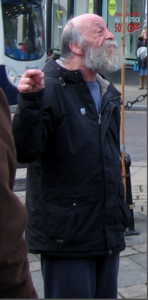Human Rights Laws and anti-discrimination legislation: part of the struggle and part of the solution?
Campaigns for anti-discrimination legislation and demands for protection of disabled people’s human rights laws are only part of the struggle to bring about the end of the inequality they encounter through their positioning within society. As disabled activists I believe we need to combine fighting for improvements within existing structures whilst at the same time seeking ways to transform them. A guest blog post from Bob Williams-Findlay.
 This a guest post from Bob Williams-Findlay, former Chair of the British Council of Disabled People. It is an excerpt from his article: Human Rights Laws and anti-discrimination legislation: part of the struggle and part of the solution?
This a guest post from Bob Williams-Findlay, former Chair of the British Council of Disabled People. It is an excerpt from his article: Human Rights Laws and anti-discrimination legislation: part of the struggle and part of the solution?
Since the middle of the 1980s in the United Kingdom there has been a call for disabled people to have full human and civil rights. In my opinion there remains far too little understanding as to why the demand for “Rights Not Charity” ended up as mainly being about campaigning for legislation. As someone who was involved from almost the beginning, I want to provide some historical background to this campaigning and in the process suggest that there are two differing ways of interpreting what “disability rights” means.
My starting point is that I have always considered campaigns for anti-discrimination legislation and demands for protection of disabled people’s human rights laws as being only part of the struggle to bring about the end of the inequality they encounter through their positioning within society. I have held this view because of my belief that the social approach towards understanding disability as a problem located within the nature of given societies, not the existence or degree of impairment belonging to an individual.
Depending upon one’s analysis of the problem of disability, campaigns for civil and human rights can be viewed in a variety of ways. Governments have addressed these campaigns as being a plea for ‘fairer treatment’ within the status quo and therefore little concrete action will be taken to resolve the real problem.
The weakness of seeing disabled people as automatically having a ‘shared agenda’ is that it does not address the fact people with impairments come from an array of socio-political backgrounds and this distorts how as disability activists address the implications of differing interpretations of what disability is, what social oppression means and therefore results in conflicting views regarding what campaigns for ‘rights’ could achieve. As disabled activists I believe we need to combine fighting for improvements within existing structures whilst at the same time seeking ways to transform them. I recognise both of these tasks are extremely difficult in the present climate, but we must look at ways we can employ the Convention on the Rights of Disabled People as leverage when putting our demands for social justice forward and resisting the attacks upon our rights during this age of austerity. It may be time once again to ask: to what extent are human rights laws and anti-discrimination legislation part of the struggle and part of the solution?
As someone who sees the problem of disability as being the social restrictions imposed upon people with impairments, then my take on ‘disability rights’ differs from the way, for example, the American disabled people employed it in their struggles or how it has come to be co-opted into the British way of thinking. From a social [model] perspective ‘disability rights’ means ‘self-determination’; the right not to be subjected to discriminatory practice or social exclusion, the right not to be dependent upon charity and the right not to be de-humanised. These rights do not require legislation, they require social change and greater respect for the whole of humanity and for the planet we inhabit. Perhaps Finkelstein is correct when he says:
… we cannot understand or deal with disability
without dealing with the essential nature of society
itself. To do this disabled people must find ways of
engaging in the class struggle where the historical
direction of society is fought, won or lost.
(Finkelstein, 2001: 5)
Download the full article here: Human Rights Laws and anti-discrimination legislation: part of the struggle and part of the solution?